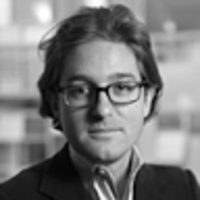
The line one heard most often expressed to those from the East at the Los Angeles Times Book Festival this past weekend was that, yes, people do indeed read in Los Angeles. After the two-day festival, there was little doubt in my mind that L.A. is a book town. Of course, some of those readers are just looking for a novel or graphic superstar to turn into the next summer blockbuster, but with attendance somewhere near 120,000 people, the festival is the largest of its kind in the country. Spread over the grassy quads of the UCLA campus, thousands of families and devoted readers ambled about to hear writers, enjoy a picnic, or visit one of the special stages for children’s authors.
Hundreds of writers, celebrities, and critics gathered to speak in classrooms and under the perfect sun about their work and the future of the book—a depressingly common theme at any book or publishing event these days. The sheer variety of the festival makes for a diverse audience. At one particular hour, James Ellroy was wryly holding forth on crime fiction with Joseph Wambaugh, a sobering panel of Mark Danner, Rebecca Solnit, and Amy Wilentz were discussing Haiti’s uncertain future, and, um, actress Alicia Silverstone talked about her new diet book (this is L.A., people).
It was strange to hear Dave Eggers say he doesn’t read on an iPad or a Kindle and that nothing has changed about the tactile experience of the book.
The weekend opened with the Los Angeles Times Book Prizes at the venerable headquarters of the eponymous newspaper downtown. With its plaques and framed front pages of yesteryear, the Los Angeles Times building is a testament to an important national newspaper, but all that history gave more than a few writers and critics pause as they headed up to the Chandler auditorium for the prize ceremony. Unlike the Pulitzers or National Book Awards, the Times makes room for unusual prizes, like the one for first fiction, which Philipp Meyer deservedly won for American Rust, and for a superb writer of the American West (this year, Evan S. Connell). The paper also unveiled two new prizes, one for graphic novels—the first major prize in the country for that genre—and the other for innovators in publishing, which was won by author-publisher Dave Eggers. Although McSweeney’s Books, Eggers’ publishing house, is one of most charming, smart, and cool publishers in America, it was strange to hear Eggers say he doesn’t read on an iPad or a Kindle and that nothing has changed about the tactile experience of the book. Readers of websites like this one and thousands who download e-books every day would probably disagree.
But perhaps I’m being churlish—as the whole weekend was a celebration of the physical, with readers crowding around their favorite authors and waiting in line to have their books signed. The greatest surprise of the weekend, and of the growing audience for book festivals across the country, is that just as reading is moving toward an ever more digital future, readers are seeking out a more intimate experience by attending festivals and readings to have the chance to speak with and listen to their favorites. A festival like this one gives the frisson of seeing a panel of one’s favorite writers chatting and discussing their craft as if they were in their living room (or, at least, that’s the illusion of the book festival). On Saturday morning, a fascinating panel of Nicholas Carr, David Shields, and Ander Monson tackled the question about the future of narrative in the Internet age and all had the same depressing refrain: Have we lost the ability to pay attention? (Most readers will have stopped reading by this point.) In the afternoon, three biographers explored the intertwined lives of Joseph Kennedy’s Hollywood years, photographer Dorothea Lange, and Labor Secretary Frances Perkins. Other panels explored how to write about the erotic, with pro-sex feminist Susie Bright; the Golden State’s tradition of noir; and the realities of the Middle East, with Daily Beast contributor Reza Aslan and former Iranian prisoner Roxana Saberi. Some of the panels were less successful than others but there was always another one to catch—or maybe just a sunny spot to read one’s spoils and eat cotton candy.
The weekend was also a testament to the way newspapers play a frankly irreplaceable role in their local communities. Sure, the Los Angeles Times is struggling like everyone else, but there was something simple and old-fashioned about the way the paper has brought a treasured weekend to L.A. with a minimum of self-congratulation and the way readers, old and young, have embraced this annual tradition and made it one of the city’s best public occasions.
Plus: Check out Book Beast for more news on hot titles and authors and excerpts from the latest books.
Lucas Wittmann is the Books Editor at The Daily Beast.






